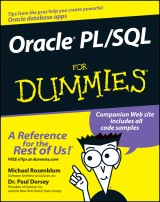Details

Oracle PL / SQL For Dummies
1. Aufl.
|
21,99 € |
|
| Verlag: | Wiley |
| Format: | EPUB |
| Veröffentl.: | 23.02.2011 |
| ISBN/EAN: | 9781118054796 |
| Sprache: | englisch |
| Anzahl Seiten: | 432 |
DRM-geschütztes eBook, Sie benötigen z.B. Adobe Digital Editions und eine Adobe ID zum Lesen.
Beschreibungen
<b>Find tips for creating efficient PL/SQL code</b> <p><b>If you know a bit about SQL, this book will make PL/SQL programming painless!</b></p> <p>The Oracle has spoken—you need to get up to speed on PL/SQL programming, right? We predict it'll be a breeze with this book! You'll find out about code structures, best practices, and code naming standards, how to use conditions and loops, where to place PL/SQL code in system projects, ways to manipulate data, and more.</p> <p><b>Discover how to</b></p> <ul> <li>Write efficient, easy-to-maintain code</li> <li>Test and debug PL/SQL routines</li> <li>Integrate SQL and PL/SQL</li> <li>Apply PL/SQL best practices</li> <li>Use new features introduced in Oracle 9i and 10g</li> </ul>
Introduction. <p><b>Part I: Basic PL/SQL Concepts.</b></p> <p>Chapter 1: PL/SQL and Your Database.</p> <p>Chapter 2: The PL/SQL Environment.</p> <p><b>Part II: Getting Started with PL/SQL.</b></p> <p>Chapter 3: Laying the Groundwork: PL/SQL Fundamentals.</p> <p>Chapter 4: Controlling Program Flow.</p> <p>Chapter 5: Handling Exceptions.</p> <p>Chapter 6: PL/SQL and SQL Working Together.</p> <p><b>Part III: Standards and Structures.</b></p> <p>Chapter 7: Putting Your Code in the Right Place.</p> <p>Chapter 8: Creating Naming Standards.</p> <p>Chapter 9: Creating Coding Standards.</p> <p><b>Part IV: PL/SQL Data Manipulations.</b></p> <p>Chapter 10: Basic Datatypes.</p> <p>Chapter 11: Advanced Datatypes.</p> <p><b>Part V: Taking PL/SQL to the Next Level.</b></p> <p>Chapter 12: Transaction Control.</p> <p>Chapter 13: Dynamic SQL and PL/SQL.</p> <p>Chapter 14: PL/SQL Best Practices.</p> <p><b>Part VI: The Part of Tens.</b></p> <p>Chapter 15: Ten PL/SQL Tips.</p> <p>Chapter 16: Ten Common Mistakes to Avoid in PL/SQL.</p> <p><b>Index.</b></p>
<b>Michael Rosenblum</b> is originally from Kremenchuk, Ukraine. In 2000, he moved to the United States, where he lives with his family in Edison, New Jersey. He works as a Development DBA at Dulcian, Inc. Michael is responsible for system tuning and application architecture. He also supports Dulcian developers by writing complex PL/SQL routines and researching new features. He is a frequent presenter at various regional and national Oracle user group conferences.<br /> In his native Ukraine, he received the scholarship of the President of Ukraine, a Masters Degree in Information Systems, and a Diploma with Honors from the Kiev National University of Economics, Ukraine. <p><b>Dr. Paul Dorsey</b> is the founder and President of Dulcian, Inc. (www.dulcian.com), an Oracle consulting firm that specializes in business rules-based Oracle Client-Server and Web custom application development. He is the chief architect of Dulcian’s Business Rules Information Manager (BRIM®) tool.<br /> Paul is the co-author of seven Oracle Press books that have been translated into nine languages: <i>Oracle JDeveloper 10g Handbook</i>, <i>Oracle9i JDeveloper Handbook, Oracle JDeveloper 3 Handbook, Oracle Designer Handbook</i> (2 editions), <i>Oracle Developer Forms and Reports: Advanced Techniques and Development Standards</i>, <i>Oracle8 Design Using UML Object Modeling</i>. In 2003, he was honored by ODTUG as volunteer of the year, in 2001 by IOUG as volunteer of the year and by Oracle as one of the six initial honorary Oracle 9<i>i</i> Certified Masters. Paul is an Oracle Fusion Middleware Regional Director. He is the President of the New York Oracle Users’ Group and a Contributing Editor of the International Oracle User Group’s SELECT Journal. He is also the founder and chairperson of the ODTUG Business Rules Symposium (now called Best Practices Symposium), currently in its sixth year, and the J2EE SIG.</p>
<b>Find tips for creating efficient PL/SQL code</b> <p><b>If you know a bit about SQL, this book will make PL/SQL programming painless!</b></p> <p>The Oracle has spoken — you need to get up to speed on PL/SQL programming, right? We predict it'll be a breeze with this book! You'll find out about code structures, best practices, and code naming standards, how to use conditions and loops, where to place PL/SQL code in system projects, ways to manipulate data, and more.</p> <p><b>Discover how to</b></p> <ul> <li>Write efficient, easy-to-maintain code</li> <li>Test and debug PL/SQL routines</li> <li>Integrate SQL and PL/SQL</li> <li>Apply PL/SQL best practices</li> <li>Use new features introduced in Oracle 9i and 10g</li> </ul>
Diese Produkte könnten Sie auch interessieren:

Pattern-Oriented Software Architecture, Patterns for Resource Management

von: Michael Kircher, Prashant Jain

33,99 €















